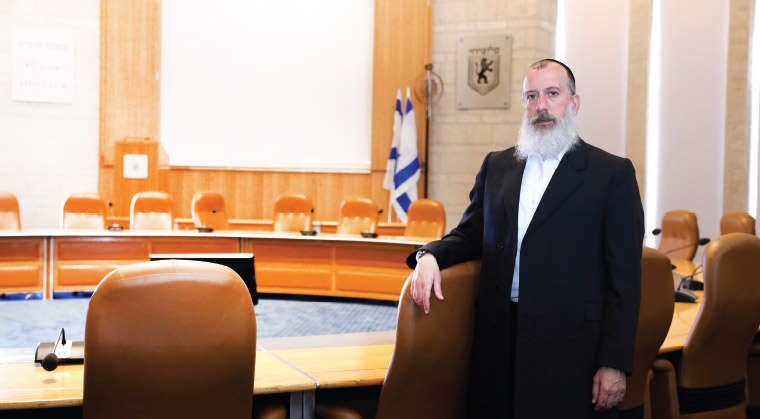
“It’s all about service.” On the streets of Jerusalem, Deitsch is known as a different sort of politician — one who makes sure the average citizen gets his water and electricity sorted out before the Shabbos siren. Can the community outside his own small sector appreciate the expertise he’s garnered? (Photos: Eli Cobin)
So many things shift in the life of Yossi Deitsch from the day we first meet in his office at Jerusalem’s Kikar Safra until the day this article is sent off for print.
He’s a front-runner on Monday and an also-ran on Tuesday and was-never-really-serious on Wednesday and he’s-a-lock-to-win on Thursday.
Standing in the sunny plaza in front of Jerusalem’s City Hall, I ask a slim young man who works as a beat reporter for one of the free periodicals you find piled up outside the Gal-Paz store in Geula if he thinks the bulk of religious voters will ultimately line up behind the chareidi candidate on October 30 in his bid for mayor.
Calling forth the air of someone who knows things, the young writer tells me that first everyone will, then no one will, then at the end they all will.
At least part of that prediction will be proven right.
To be a candidate in such a volatile climate, I think, is the equivalent of driving on a highway upon which traffic directions keep shifting, as random stop signs pop up and change the pattern every few feet. Only a certain type of person could handle that.
Yossi Deitsch is that guy.
Time for Accountability
There’s a certain new dynamic in the sphere of Israeli chareidi politics. Yossi Deitsch isn’t the agent of change, but he’s a reflection of it.
For more than half a century, the chareidi camp in Eretz Yisrael was more or less focused on one thing: protecting, safeguarding, and strengthening Torah.
The politicians, by and large, were one with the message — indignant and fierce, rather than diplomatic. There was no choice.
But things changed. The Israeli Supreme Court — the Bagatz — assumed a more powerful role, moving in on the issues traditionally debated in the Knesset, making some of that lobbying irrelevant.
Furthermore, differing views within the chareidi camp — the absence of a single, unified directive from gedolei Torah across the chareidi spectrum — created sort of a situation where the chareidi voter could choose between different parties and candidates, all of whom came from “his world.” Uniform party-controlled newspapers and news sites faced real competition, and there evolved actual debate, exchange of ideas, back-and-forth.
And the rise of alternative media meant that for the first time, the message of the chareidi politician was coming forth not just from the black-and-white newsprint of the daily Hamodia or Yated, neatly packaged between mazel tov announcements and ads for a new peirush on Megillas Esther, but from the cell phone and computer screen.
They were being televised and recorded.
Without mercy.
Some of the old-school politicians never really got the hang of it, ending up in embarrassing hot-tape moments with the recordings released by chareidi websites, a situation unimaginable ten years ago. Those were the ones screaming “chutzpah” when confronted by cellphone cameras waved by frum paparazzi determined to catch the politician on the way out of beis din, into a shivah house, or while waiting in line at the makolet.
The new media, especially in Eretz Yisrael, expected accountability from their frum politicians as well.
Whether that’s a good thing or not is irrelevant, because it became the new reality. Popularity, accessibility, and helpfulness are what made a difference.
Yossi Deitsch seemed tailor-made for a 2018 campaign: he holds impeccable chareidi credentials, but is also suave, smart, well-spoken, with a track record of results beyond earning sectarian benefits.
But then he walked into quicksand, or ran into a brick wall, or hit a bump in the road — choose your metaphor — and the very chareidi establishment that spawned him, his own community, didn’t line up behind him. It looked like it was over from the start.
But Yossi Deitsch is a cool guy who knows how to ride the waves.
(Excerpted from Mishpacha, Issue 731)


